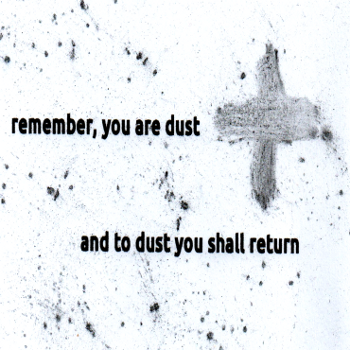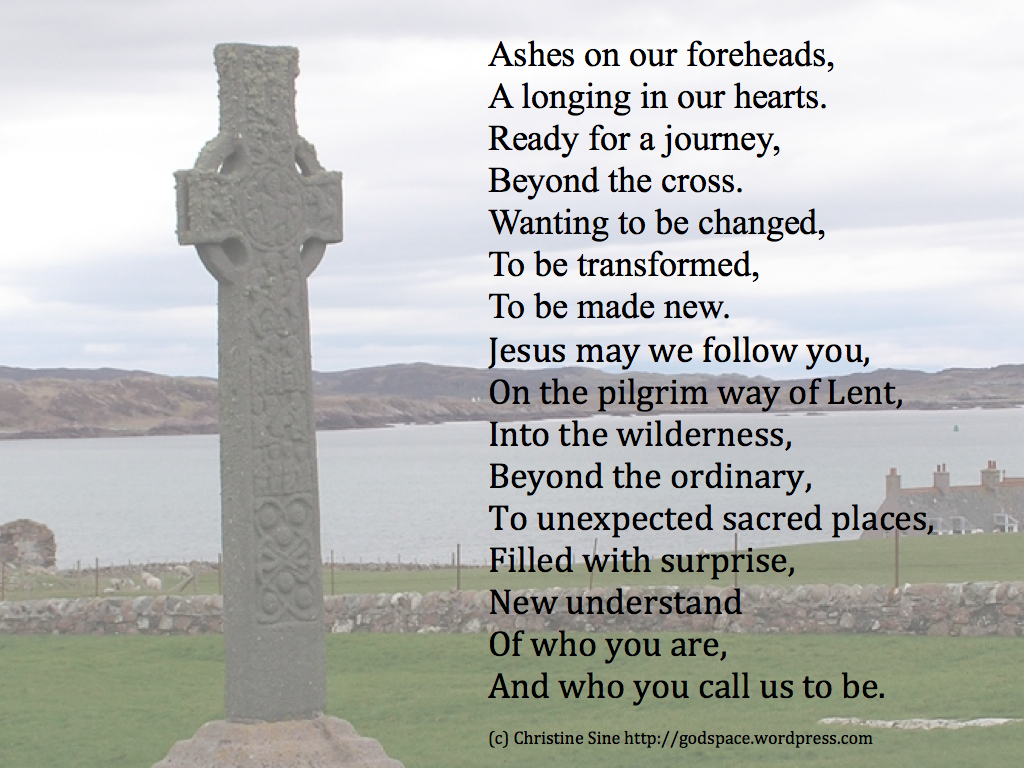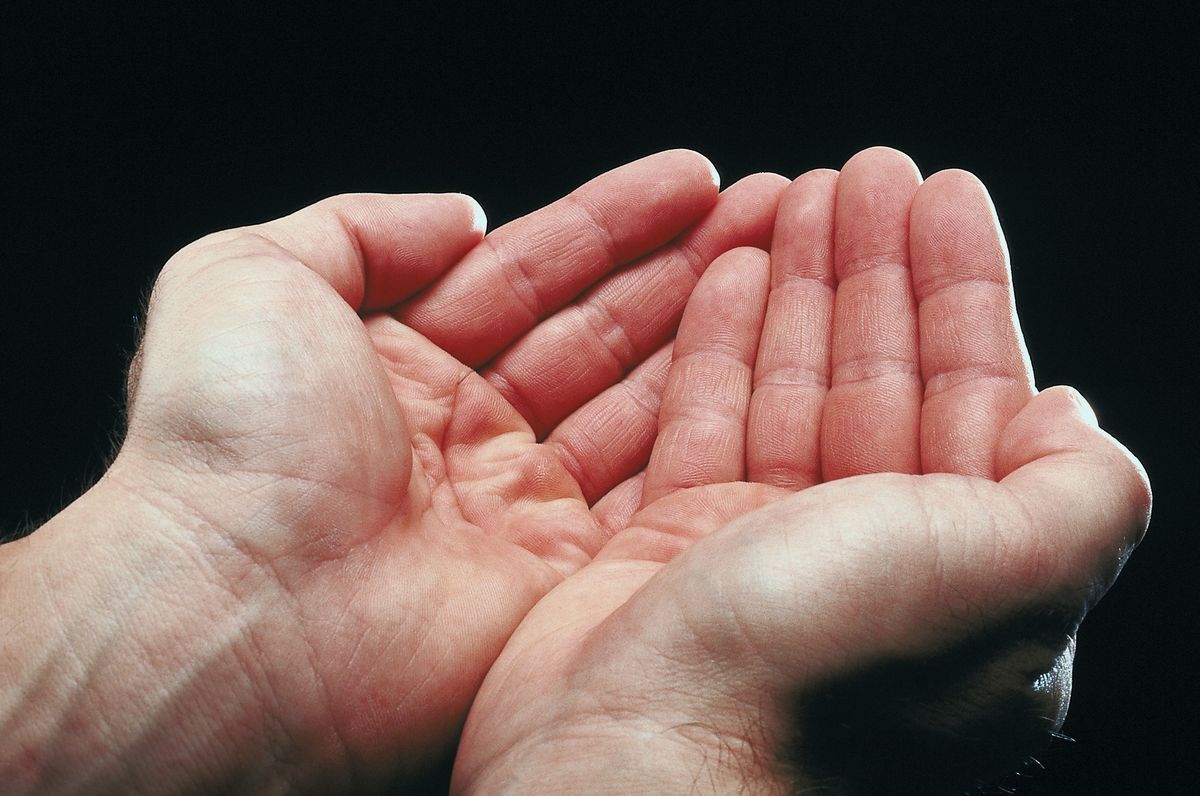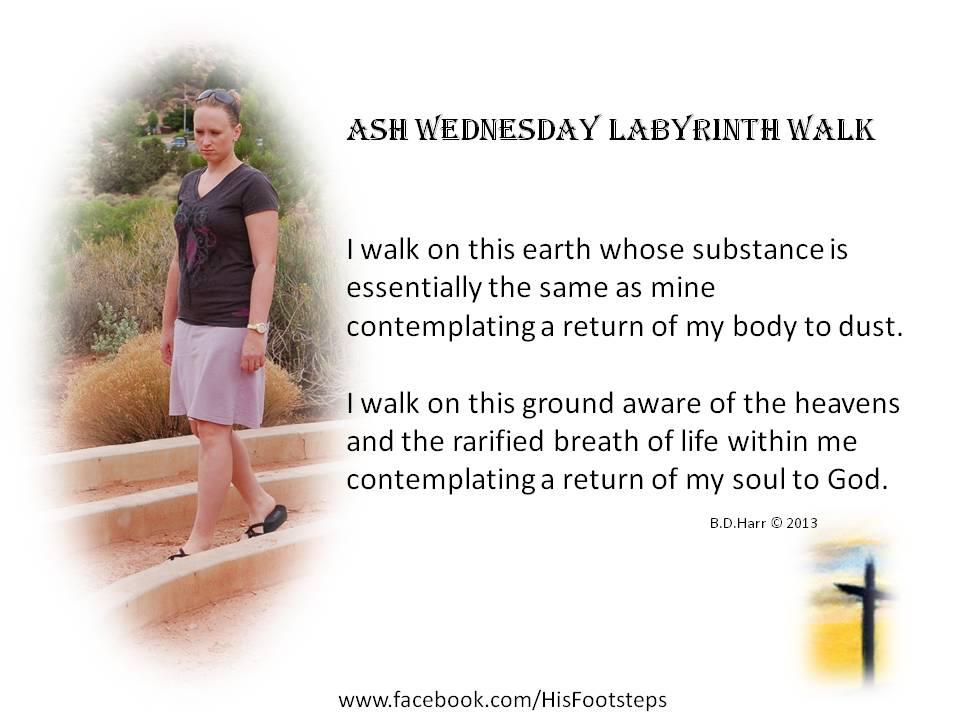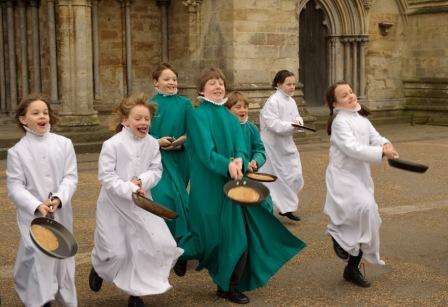Today’s reflection in the series Return to Our Senses in Lent, comes from Andy Wade, the communications guy at Mustard Seed Associates. Andy also runs the homeless shelter in Hood River Oregon, is a keen gardener and preaches on the side. This reflection comes from his sermon for Ash Wednesday.
Return to our Senses in Lent What does that mean for you? For me, it’s a reminder that I’m not God. To return to my senses is to return to the person God created me to be and to stop trying to orchestrate God’s mission in my life and the world. Let be back up a bit…
For the Western Church, Wednesday marked the beginning of Lent, 40 days of self-examination, of deep reflection, of humility.
One thing that bothers me about Ash Wednesday is the smearing of ashes thing. While there is good, biblical support for acts of repentance marked by ashes, I wrestle with those words, “From dust you were created, to dust you shall return.” Words from the curse after “The Fall” of Adam and Eve in the garden. But haven’t we been redeemed from the curse in Christ Jesus, our Lord!
As I reflected on this, I remembered my own experience of deliverance. For four years I suffered with pretty serious panic attacks. I ended up at the hospital more than once and was actually to the point of not wanting to go out and do things if it meant I would be any distance from emergency help. All that ended one afternoon when a good friend laid hands on me and prayed for my healing. In an instant, the panic attacks were gone – that was over 20 years ago! But that’s not the end of the story. God took away the debilitating panic attacks but did not heal me of generalized anxiety and mild depression. Why was that?
It was also about this time that I heard God’s call into pastoral ministry. I loved studying scripture and even more, discovering all the many threads that tie it all together and reach out to weave us into God’s story. And as I began this new journey I realized why I was not fully healed. It was because I trust too much in myself, my own abilities and my intellect. If God had chosen to fully heal me I would have wandered off into the ministry filled with pride and self-sufficiency. The only way God could use me for his purposes is if I had to trust in God, not in myself.
I believe there’s truth in that story for all of us. The Apostle Paul seemed to see it too, speaking of his “thorn in the flesh”. And whether we like it or not, the effects of sin, that big “S” sin we all participate in all the way back to Adam and Eve, still clings to us like flypaper.
We are redeemed. We are “saved” in Christ Jesus. There’s no doubt about it. But women still suffer in childbirth, we still work by the sweat of our brow, and we all, ultimately, return to dust as death catches up to us. If we’re listening, we are reminded daily of our weaknesses. We are reminded that God never intended us to live lives of self-sufficiency, of pride, of independence – especially from God. We were created for community. We were created for one-another and for God. And the remnants of the curse remind us just how dependent we are.
Shall we wallow in the curse, fearing death and doing whatever we can to hold on to life? Jesus not only teaches us, but lived into, a completely different reality; the reality that in order to truly live, we must die. We must take up our cross daily and follow him. To overcome the sting of death we must embrace it on the cross.
The cross, that symbol of redemption from the curse. That which was meant to take life in the most horrifying and humiliating manner has become for us the symbol of life. And Jesus calls us to not just embrace the cross as a symbol of life, but a way of life. A life of living, loving, sacrifice. A life devoted to God and the purposes of God – which naturally implies a life devoted to loving others even when it appears to cost us everything.
And so we arrive at Ash Wednesday and the beginning of Lent. Ultimately the sin of Adam and Eve, and really of all of us, is that we attempt to usurp the place of God. We forget that We are not in charge, God is. Lent is a time to remember that God is God and without that sweat breath of the Holy Spirit, we are but dust and to dust we shall return.
Lent is also a time to remember how often we get it wrong. Like Jesus’ followers who shout Hosanna in the Highest heaven” as Jesus rides the lowly donkey into Jerusalem – fully expecting some kind of military coup that will restore Israel to its former glory, we often miss what God is really up to. We have our big ideas. But God can and will do even more than we can ask or even imagine!
Lent is a time to remember that Jesus came not for his own glory, but for the life of the world. And when we follow him in life, taking up our crosses daily, we too are to live lives of sacrificial love for one another.
You can be sure that whatever it is that God is up to, it will involve expanding God’s Kingdom purposes – extending the joy of healing, hope, and reconciliation to our friends, neighbors and even the strangers in our community. But the only way we’ll see it is if we embrace our weaknesses, recognize that we are but dust – dust infused with the life-giving breath of God, and walk humbly into the future, trusting fully in our Creator.
So how am I “returning to my senses in Lent”? My new discipline this season it to be keenly aware of my motivations, especially those that usurp the place of God in my life. Part of this discipline will be to intentionally ask for help more often. When I choose not to ask for help, to ask God to reveal to me the underlying motivation behind my “independence”. Sometimes we do need to “go it alone”, but often we don’t. So a follow-up question this season will be, “how does my choice to go it alone affect not just my spiritual well-being, but the spiritual well-being of those around me, my family, friends, and community.
What new, or old, spiritual discipline are you engaging as you walk through these 40 days? We’d love to hear from you!
Yes I know that Ash Wednesday is over, but Odyssey Networks has just adapted one of my Ash Wednesday prayers for meditation. It appears on their mobile app Call On Faith and I thought that some of you might appreciate it.
Putting prayers like this to music with photos is a practice that I find very faith building. I am currently working on another Lenten video which I hope to share later in Lent. Perhaps it is a practice you would like to enter into during this Lenten season.
Today’s reflection for the Return to Our Senses in Lent comes from Lynne Baab. Most of this post is an excerpt from her new book Joy Together: Spiritual Practices for Your Congregation. Lynne is a Presbyterian minister and lecturer in pastoral theology in New Zealand, and also the author of numerous books. She has three books which are particularly appropriate for the season of Lent: Fasting, Sabbath Keeping and Joy Together. Visit her website, to learn about her books and to read articles she’s written on topics related to her books.
About ten years ago I led a worship service at a retreat. The setting was intimate, unlike the Sunday worship services at church where the leader—sometimes me—usually stood some distance away from the congregation. At the end of the retreat worship, I said a benediction. To my surprise, several of the younger women sitting close to me turned their hands so their palms faced up. They looked as if they were trying to catch the benediction in their hands.
I had often said, “Now, receive the benediction” before I ended a worship service, and these women looked as if they were taking those words seriously. They used their hands to indicate a posture of the heart, a posture of receptivity.
What might they have been trying to receive? What might they have been longing for?
Perhaps some of them had a specific need in mind as they turned their hands up to “catch” God’s blessing. Perhaps they were hoping for God’s action related to a specific need in their family or in their job, or maybe they were hoping for God’s guidance in a particular situation. Perhaps they had learned something new about God at the weekend retreat, and they were hoping God would cement that new knowledge into their lives. They could have had many other specific needs, requests or situations on their minds as they used their hands to “receive” the benediction.
Perhaps some of them were simply open to more of God in their lives. Perhaps the motion of their hands expressed a willingness to receive anything and everything from God, an indication of their commitment to be disciples of Jesus who would follow their Master wherever he might lead them.
When I use this word “receptivity,” I am referring to being open to God’s gifts and God’s guidance in two different ways. On the one hand, God works in our lives in response to the needs we express in prayer, the concerns we have about people we love, and the tensions and anxieties we experience in everyday life. God invites us to open our hearts and minds to see the way the Holy Spirit is moving in the situations we care about. Spiritual practices go a long way toward enabling us to see God’s activity because they help us slow down, recognize patterns, and listen to God.
The second aspect of receptivity relates to our willingness to let God initiate, to let God be God in whatever form that takes. Jesus invites us to follow him, to let him set the agenda and lead us. “Take my yoke upon you and learn from me,” Jesus encourages us (Matthew 11:29). God guides us into places we wouldn’t otherwise go, and challenges us to grow in ways we never imagined. God gives us gifts we could never have seen on our own, and calls us to use them in situations we never planned. Spiritual practices help us receive these utterly unexpected and unplanned moments of grace.
When I pray with my hands turned over and open to the heavens, my hands are a symbol of my willingness to be receptive to whatever God is doing in my life, whatever God wants to give me, and wherever God wants to guide me. But those open hands are more than a symbol. I find that simply turning my hands over opens my heart to God in a remarkable way, as if my hands are telling my heart and mind to shift toward God and to watch for what God is doing. I feel closer to God when I turn my hands over, a surprising but helpful fact. Lent is a perfect time to experiment with new spiritual practices, and a small thing like praying with open hands, facing up, really can make a difference.
Here is a beautiful prayer from Bonnie Harr designed to be used in walking the labyrinth at this season.
Playing for the ashes… it conjures up for many of us (at least from the British Commonwealth) the test cricket match between Australia and England, probably one of the most fiercely fought international games. But that is not what I am writing about here. The ashes that I am thinking of have nothing to do with a game but with Ash Wednesday which ushers in probably the most serious event of history – Jesus final days and his walk towards the Cross.
For many of us, today (yes, it is already Ash Wednesday in Australia) marks the beginning of a personal journey too as we join Jesus in his final days. Unfortunately, many of us treat the season of Lent like a game – more like the cricket match called the Ashes than like the serious turn around time it is meant to be. We come to the season with a list of trivial things we intend to give up – TV, video games, chocolate, but most of us don’t really take the season seriously or use it as a time to dig deeply into our hearts to sweep out the corners in which sin has accumulated.

Ash Wednesday cross
The ashes used in church services on Ash Wednesday are traditionally made by burning the Palm Sunday crosses from the previous year so this year I decided to experiment. My Palm Sunday cross from last year was still sitting in my office, so I burnt it, reminding myself that the repentance I seek at this season is only possible because of the incomprehensible gift of Christ and his death on a cross 2,000 years ago.
Burning my Palm Sunday cross had a big impact on me. It reminded me that the crucifixion is not really meant to be the focus of our mourning and fasting. We mourn and fast not because we are heading to the cross but because we want to shed all that disrupts our intimate walk with God. We look beyond the cross to the life of God’s kingdom. Asking myself what still needs to be repented of and transformed in my life so that I can be an effective citizen of God’s resurrection created world is probably the most important question of Lent. I want to become all that God intends me to be. I want to leave behind all that prevents me from becoming that person. I want to thirst for righteousness and hunger for justice rather than for water and food.
Shrove Tuesday is the day before Ash Wednesday, the beginning of Lent in the Western Church. “Shrove” is the past tense of the word “shrive,” which means to hear a confession, assign penance, and absolve from sin. Shrove Tuesday is a reminder that we are entering a season of penance.
Shrove Tuesday is also known as Fat Tuesday or Mardi Gras (which is simply French for Fat Tuesday). In Italy, Fat Tuesday is known as carnevale-goodbye to meat-from which we get our English word carnival. Traditionally people held one last rich feast, using up perishables like eggs, butter and milk before the fast of Lent began. Now in some places, like New Orleans, this has become a huge celebration that really has nothing to do with the beginning of Lent.
For many however this is still a significant day. Many churches hold pancake suppers, often as a way to reach out to their neigbours. You can find a great collection of recipes and traditions from around the world for Shrove Tuesday in Fat Tuesday Recipes.
For Eastern Orthodox Christians Clean Monday, the Monday before Ash Wednesday, is the first day of Great Lent. It is a reminder that we should begin Lent with good intentions and a desire to clean our spiritual house. It is a day of strict fasting for Eastern Catholics and orthodox, including abstinence not only from meat but from eggs and dairy products as well.
The following prayer of St. Ephrem the Syrian is a common prayer used during this season.
O Lord and Master of my life, keep from me the spirit of indifference and discouragement, lust of power and idle chatter. [kneel/prostration]
Instead, grant to me, Your servant, the spirit of wholeness of being, humble-mindedness, patience, and love. [kneel/prostration]
O Lord and King, grant me the grace to be aware of my sins and not to judge my brother; for You are blessed now and ever and forever. Amen. [kneel/prostration]
For a meditation based on clean Monday check out Meditation Monday – Clean Up Your Act
As an Amazon Associate, I receive a small amount for purchases made through appropriate links.
Thank you for supporting Godspace in this way.
When referencing or quoting Godspace Light, please be sure to include the Author (Christine Sine unless otherwise noted), the Title of the article or resource, the Source link where appropriate, and ©Godspacelight.com. Thank you!

